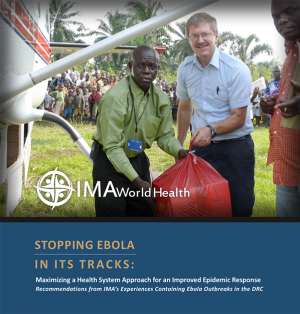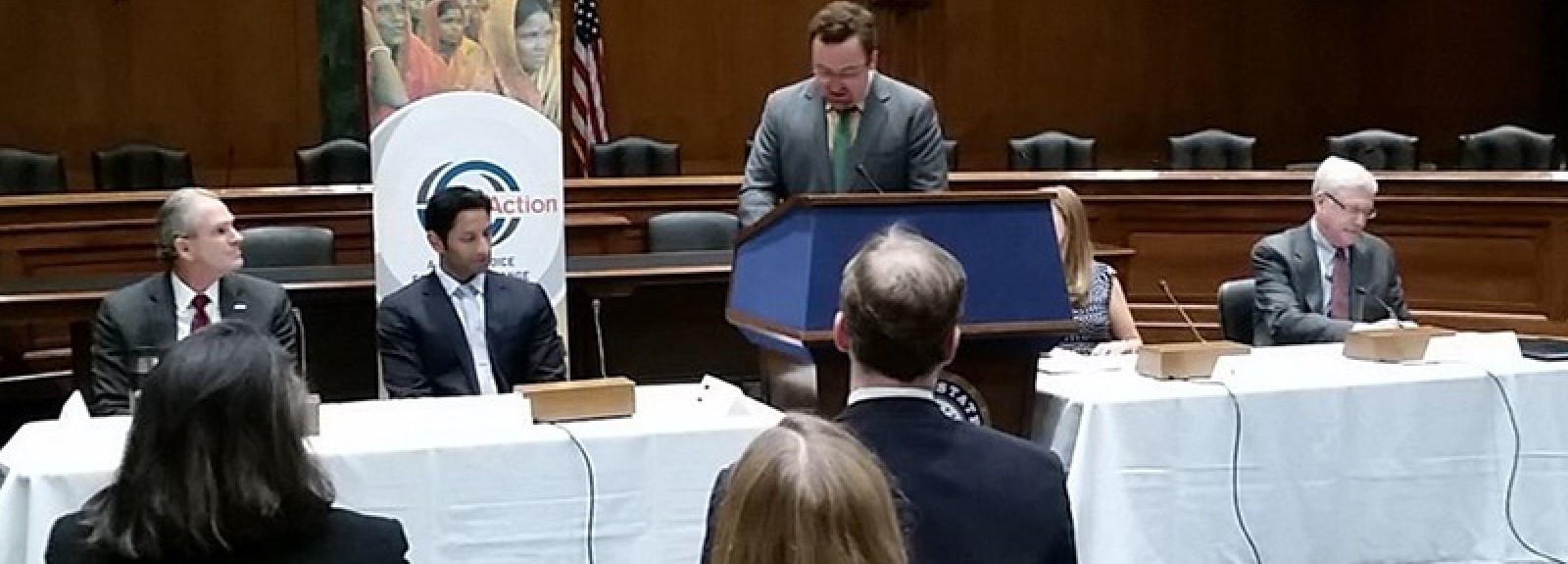IMA World Health/Evan Novalis
T
he Ebola outbreak in West Africa in 2014 presented a huge logistical challenge for governments, international bodies and non-governmental organizations. These actors had to cooperate to tackle complicated issues, including surveilling communities for new cases and disseminating accurate messages on how to prevent the spread of Ebola.
Although the current Ebola outbreak has largely been contained, with only small flare-ups occurring this year, the lack of a cure for the virus (no vaccines have been developed to protect against Ebola) and the weak state of health care in the region makes it possible that another outbreak could occur in the region, endangering the lives of many people.
InterAction, an alliance organization of NGOs, held a panel discussion titled “The Future of Global Health: Lessons Learned from Ebola.” The discussion was co-hosted by U.S. Sen. Chris Coons on March 17 at the Dirksen Senate Office Building in Washington, D.C. A panel of four NGO implementers talked about key issues related to the Ebola outbreak during the event that brought together over 100 attendees. The event provided an opportunity for IMA to hear from NGOs on how their projects addressed the outbreak and to learn how best the global health community can prepare for possible future outbreaks.
The four panelists represented Global Communities, Project Concern International, World Vision and International Medical Corps. Opening remarks were made by Rep. Chris Smith, a staff member of Sen. Coons and by Mia Beers, leader of the USAID Ebola Disaster Assistance Response Team. The panelist session was concluded by remarks by the Healey International Relief Foundation.
Three key points brought up by the presenters were the importance of community engagement, adaptive learning during the outbreak and strengthening health systems to mitigate the risk of future outbreaks.
A common theme among the NGO panelists was that a successful Ebola response depended not only on proper medical care at the health facility level, but also on strong interventions at the community level. Such interventions often took the form of training community surveillance teams, community and faith leaders on key Ebola messages. These messages were aimed at informing community members, reducing fears and changing dangerous health behaviors.
A second point explored during the panel event was the concept of adaptive learning in the context of this outbreak. From the beginning, there was no clear solution to ending the outbreak. This was the first time Ebola had occurred in West Africa and the first outbreak of this scale, affecting both rural and urban populations in several countries. Understanding the context of the areas where Ebola was being transmitted was important to ensuring that interventions were effective, but this preparation had to be balanced against the fact that immediate action was also required to prevent further infections and deaths. Cultural traditions in the region, such as the ritual washing and touching of corpses of family members, exposed significantly more people to the risk of being infected. However, during the height of the outbreak many people were buried without a final viewing by family members or were cremated. There was a risk that family members would not cooperate with the protocols for burial, even going as far as hiding known cases of Ebola from health officials so that burials could be done in a respectable way. The need for health officials to ensure protection from further infections while gaining the trust of local communities led to the development of “safe and dignified burials”: a solution that allowed family members to see the corpse before they were buried in an identifiable grave.
Another point identified by the panel was that investments in strengthening the health systems of these countries hit by the Ebola outbreak were required to prevent an outbreak of this scale from occurring again. One of the primary reasons why Ebola was able to spread so quickly was that the level of health care was inadequate in properly containing the outbreak. For example, there is about 1 doctor per 100,000 people in Liberia compared to 250 doctors per 100,000 people in the United States. In addition, infrastructure issues, such as lack of running water in some health facilities and lack of protective equipment, made health staff particularly vulnerable to infections and facility closures. The hope is that with increased investments by local and foreign governments and donors into these health systems, the possibility of an Ebola outbreak spreading out of control and into so many different geographic regions is greatly reduced, due to familiarity with the virus and better emergency response capabilities.
In 2014, IMA worked with the Christian Health Association of Liberia (CHAL) in Lofa, Nimba and Bong counties to respond to the outbreak. With the generous contributions of Lutheran World Relief, Week of Compassion, the American Baptist Churches USA, and Church of the Brethren, CHAL conducted an Ebola awareness campaign targeting religious and community leaders, health care leaders and the community at-large with Ebola prevention and control messaging. In addition, CHAL distributed 64 personal protective equipment kits to hospitals and health care centers in the three counties.
Although Ebola is no longer considered a Public Health Emergency of International Concern by the World Health Organization, it remains a global health threat for the near future. It is important for IMA to work with the international NGO community to share success stories and learn what is being done to prevent global health emergencies.
 IMA World Health’s work on the frontlines of strengthening fragile health care systems often brings us in contact with new infectious disease outbreaks. Nowhere is this more pronounced, and deadly, than in the Democratic Republic of Congo (DRC), where we have worked in close concert with the Ministry of Health, faith-based organizations and networks, civil society organizations, and international health agencies to confront and control nascent Ebola outbreaks since 1995.
IMA World Health’s work on the frontlines of strengthening fragile health care systems often brings us in contact with new infectious disease outbreaks. Nowhere is this more pronounced, and deadly, than in the Democratic Republic of Congo (DRC), where we have worked in close concert with the Ministry of Health, faith-based organizations and networks, civil society organizations, and international health agencies to confront and control nascent Ebola outbreaks since 1995.
A study released in 2015 explores IMA’s experiences — dating back to the 1995 Ebola outbreak — helping the government rapidly contain Ebola. We offer several key lessons learned and recommendations that can help the DRC better prepare to respond to future epidemics.
Related: IMA support saved lives in Liberia during Ebola outbreak


